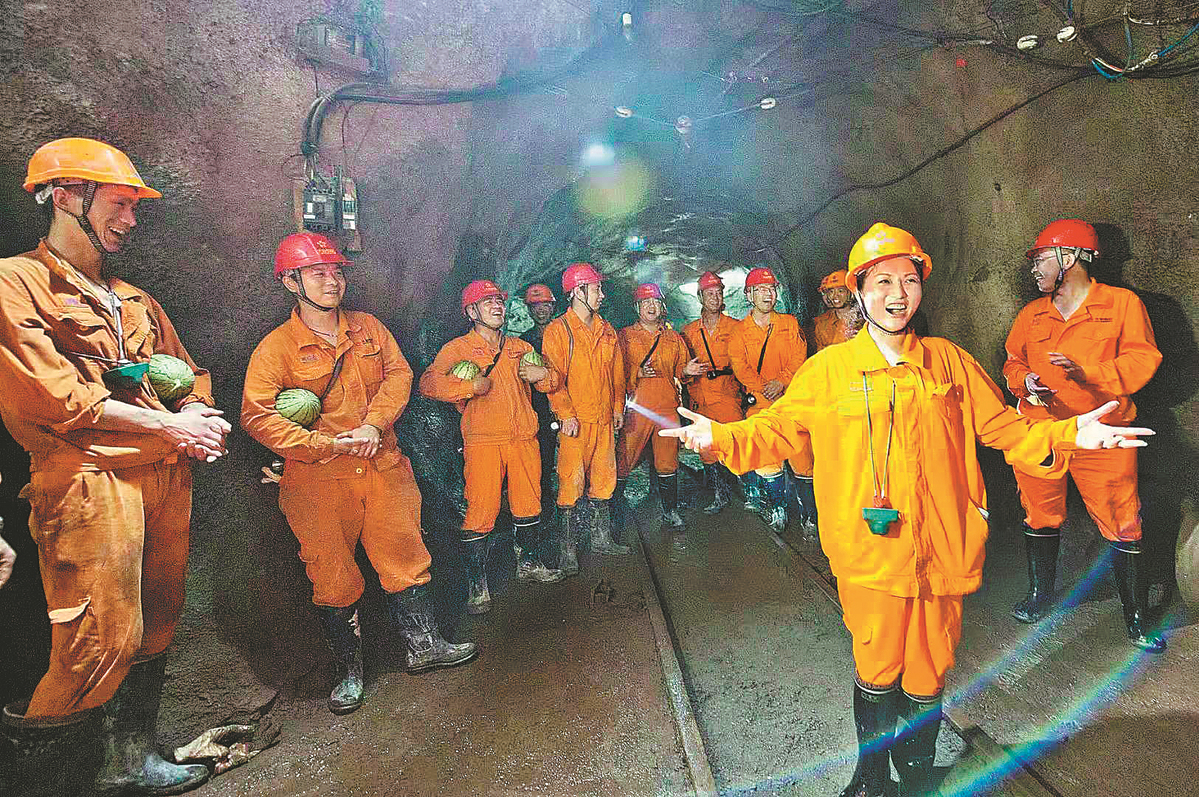NPC deputy has two voices: one for singing, another for service

NPC deputy Li Li (right) sings for miners during an inspection tour in Hubei province. CHINA DAILY
In the nine years she has served as a deputy to the National People's Congress, Li Li, who comes from Huangshi, Hubei province, hasn't visited her relatives during Spring Festival, the Chinese holiday in the January-February period that is associated with family reunions.
Li, who works at the Daye Nonferrous Metals Group Holding Co, said that instead she spends that time conducting surveys related to potential motions and suggestions before the start of the two sessions, the annual gatherings of the national legislature and top political advisers that kick off in early March.
During this year's meetings, Li's motions and suggestions will focus on a number of issues, including the establishment of an electronic information center in Huangshi, medical reform to improve disease prevention and stronger support for traditional Chinese medicine.
"I've made 173 motions and suggestions over the past nine years, covering a wide range of topics, such as welfare for the disabled, environmental protection, rural development, medical reform and food safety," she said.
Many of her ideas have led to policy changes and improved conditions for vulnerable groups.
For example, with support from other deputies and social groups, her efforts have helped ease the financial burden on disabled students pursuing higher education.
Li also worked with others to raise the protection level for the Yangtze River's finless porpoise, an endangered species that lives in the river. In 2014, its protection level was officially raised to Level 1, the top level, thanks in part to her advocacy.
She is particularly proud of being a voice for patients who requested the inclusion of drugs targeting certain cancers on the national insurance drug list.
Before officially making the proposal during last year's two sessions, Li had been collecting opinions on the matter since 2016.
"Some cancer patients would frequently change our interview appointments because of unstable health. This happened even more frequently in winter because the risk of getting sick in bad weather was higher," Li said.
She spoke of one of her interviewees, a 23-year-old patient whose family had sold all their property to buy him medication but were still unable to save his life.
"Many cancer patients are struggling to survive at the cost of their families' living conditions, because the medication is too expensive," Li said. "When I presented a letter signed by about 3,000 cancer patients and expressed their wishes during the group discussion at the two sessions, many deputies broke into tears."
In December, the National Healthcare Security Administration announced that 18 cancer medications would be added to the national insurance drug list. The change was reflected in the updated list on Jan 1.
"I was excited to hear the news, although some of my interviewees had passed away by the time the list was updated. As a deputy, being a voice for people is sometimes a race with time. I always bear this responsibility in mind," she said.
Carrying out duties is sometimes a bit more challenging for Li, as she has a leg disability from a childhood accident, and walks with a crutch. "I don't want it to earn me particular attention or care," she said. "Huangshi only has two deputies, and as such a rare and important job was granted to me, I should perform as well as others and work to eliminate discrimination against the disabled."
Li said that her optimism and determination are partly a result of her passion for music. "I have loved singing since I was a child. Music erased all the pain and hurt in my life," she said.
Through years of practice and performing, she has earned many awards and is now a part-time instructor at the Wuhan Conservatory of Music in Hubei.
During the 2008 Beijing Summer Paralympic Games, she was even invited to perform at the opening ceremony in the National Stadium.
Of all the events during the Paralympic Games, she is particularly interested in Alpine skiing.
"I have a leg disability. Alpine skiers glide forward rather than walk, and sometimes they can even fly. I really want to have that kind of experience, where all people move the same way despite the differences between us," Li said.
- Top legislature schedules standing committee session for late February
- China's top legislator meets with Uruguayan president
- Senior legislator surveys Anhui on formulating outline of provincial 15th Five-Year Plan
- China's top legislator meets with British PM
- NPC deputies see more engagement with top court



